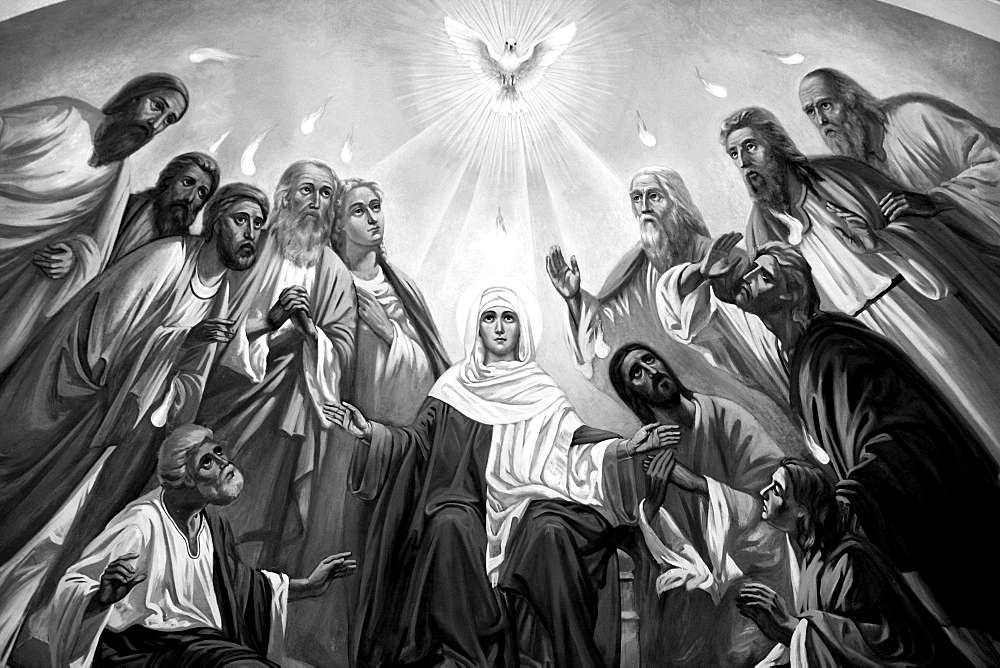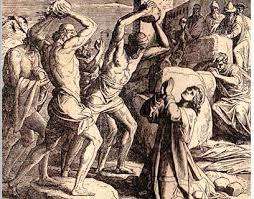

Universal Bestowal of Salvation and Holy Spirit
Dr. Shaibu Abraham
Unlike the Old Testament model of salvation, the New Testament reveals a new paradigm for the salvation of the entire world. Salvation from God is now universally available to all people, regardless of their nationalities, ethnicities, cultures, and languages (Rom. 10:12). In contrast, the Old Testament emphasizes that salvation was first offered to the Jews and then, through them, the redeeming grace was transferred to the Gentiles. The nation of Israel was chosen by God to be a special royal priestly class, supposed to be a light to the nations (Isa.49:6), but they failed in their commission of being the herald of good news for all.
However, with the incarnation of God’s Son and His ministry, suffering, death, and resurrection, a paradigm shift occurred in the mechanism of salvation. Now, salvation is offered directly to all nations and languages. Gentiles can become the new people of God (the new Israel) through faith in Christ. They are no longer strangers and aliens but citizens and members of the household of God (Eph. 2:19). Moreover, they have become worthy vessels to receive the gift of the Holy Spirit that was eternally planned by God and revealed through the prophets of the Old Testament, especially in the prophecy of Joel (Joel 2:28-29). The Acts of the Apostles narrates the great outpouring of the Holy Spirit upon “all flesh.”
Exclusivity of Salvation and Spirit in the Old Testament:In the Bible, God’s plan of redemption of humanity was unfolded progressively, through patriarchs, the life of Israel and later through prophets and so on. In the OT, salvation frequently refers to being rescued from physical rather than spiritual trouble. The exodus event where the people of Israel delivered from slavery of Egyptians and the destruction of Pharaoh and his army (Exod. 14:1–23), can be termed as the best instance. Later stages, God repeatedly saved Israel from its enemies, through judges, kings and other leaders. In the psalms, we encounter individuals’ prayers for salvation from enemies that threaten their safety or life (Ps. 17:14; 18:3; 70:1–3; 71:1–4; 91:1–3). God did not save his people from physical danger as an end in itself; it was the necessary means for his plan to save them from their sins. However, these all events were mostly in relation to the nation of Israel. Seldom we find salvation provided to outsiders. Even though these are examples of national deliverance, they had a profound spiritual component as well. The OT clearly recognizes the need for salvation from sin (Ps. 39:8; 51:14; 120:2; Isa.52:13–53:12) but, it does not provide a final solution (Heb. 9:1–10:18).
Similarly, the Holy Spirit in the OT was given to specially chosen individuals to equip them for achieving great tasks and services; for instance, Jephthah (Jud.11: 29), Samson (Jud. 14:19 ff), Gideon etc. were endowed with power to accomplish God’s work. Besides, Holy Spirit was provided to prophets such as Amos, Isaiah, Jeremiah to proclaim God’s counsel. The Spirit of God inspired prophets to “speak the word of the Lord,” warn, exhorts and comfort the people; as the prophet Micah says, “But as for me, I am filled with power, with the Spirit of the Lord, and with justice and might, to declare to Jacob his transgression and to Israel his sin” (Mic. 3:8).However, provision of the Spirit was not universally available in the Old Testamentperiod.
Bestowal of Salvation and Holy Spirit to All: As we turn to the New Testament, the universality of salvation is a key theme, emphasizing that salvation is available to all people, regardless of their background, ethnicity, social status, or language. Besides, salvation is received only through Jesus Christ, unlike salvation channelised through sacrifices and other practices. The New Testament presents the fundamental fact that God brings salvation in Jesus Christ which includes coming eschatological fullness of salvation. At the birth of Jesus, it was announced that he would save God’s people from their sins and that he was the Saviour for all, fulfilling the Old Testament prophecies, ultimately bestowing a fuller dimension of salvation through Christ. Luke reports, “But the angel said to them, ‘…I am bringing you good news of great joy for all the people: to you is born this day in the city of David a Saviour, who is the Messiah, the Lord’” (Lk. 2:10-11).
Jesus began his public ministry with the preaching of salvation, which also included the coming eschatological kingdom, the fullness of salvation; “Repent, for the kingdom of God/heaven is at hand!” Salvation was central to the message of Jesus, who was sent by the Father to “save the world” (Jn. 3:16-17). The forgiveness of sin, and moral transformation, were decisive salvific events (e.g., Luke 5:17–32; 19:1–9). The gift of life and the promised relationship with the Father through Jesus are specific themes of salvation in the Gospels. In the same way, miracles of healing and particularly exorcism were also events of salvation, that demolished and destroyed satanic strong holds and his agents (Mat. 12: 28-29; Lk. 11:20-22). Jesus’ suffering and death were decisive events in the process of salvation of humanity that achieved redemption of entire world, including the past and future generations.On the cross, Christ crushed head of the devil, disarmed the rulers and authorities and made a public example of them, triumphing over them (Col. 2:15), thus, breaking the chains of these powers on humanity.This means that no one is excluded from salvation, and all who believe in Jesus Christ can be saved (John 3:16).Furthermore, in the resurrection of Christ, victory over sin and death were achieved, and inaugurated the eschatological kingdomof God that has to come very soon with the return ofChrist. Thus, salvation in its full extent including heavenly abode is guaranteed to all humanity. The New Testament underlines fundamental truth that God desires all people to be saved and come to a knowledge of the truth (1 Tim. 2:4). This emphasizes the inclusive nature of God’s love and salvation, and the fact that salvation is not limited to a particular group or people.
The truth of the universality of salvation and the provision of the Spirit is fully realised in the Acts of the Apostles. Several examples of salvation being offered to all people, regardless of their background or social status are seen here. In the event of Pentecost (Acts 2:1-47), it is not only that Holy Spirit had come upon the disciples of Jesus but the crowd that gathered in Jerusalem from more than fifteen languages, nationalities and ethnicities all over the world, heard the disciples speaking in their own languages the great deeds of God. TheApostle Peter’s sermon outlined the salvific plan for all nations and languages to all who call on the name of the Lord.It is mentioned that about three thousand people were added to the new movement.
However, the major emphasis of Peter’s sermon in Acts 2 was the provision of the gift of the Holy Spirit to all. Quoting Prophet Joel’s prophecy, Peter explained that the events occurred there were the fulfilment of the prophecy of the pouring out of the Spirit in the “last days” (Acts 2:17a). Moreover, it is potentially universal - crossing all age, gender, and socio-economic boundaries - and is available from generation to generation (2:17b–18, 39).It is the pouring forth of the Spirit of prophecy (2:17b–18).He had also emphasised the fact that the gift of the Spirit was given to all through the Messiah (Jesus Christ) and his crucifixion and resurrection.After Jesus ascended to heaven, he sent the Holy Spirit to his followers, accompanied by extraordinary events and the phenomenon of speaking in tongues, which the crowd witnessed. He exhorted the crowd gathered there to repent and be baptized in the name of Jesus Christ for the forgiveness of their sins, promising that they too would receive the gift of the Holy Spirit.Thus, the church of Christ was formed and become the herald of salvation and Holy Spirit to all.
In Acts chapter 8, we encounter the story of the proclamation of the gospel to Samaritans, who were considered impure and untouchable by Jews, by evangelist Philip. The mission to Samaritans had been initiated by Jesus himself in his encounter with the Samaritan woman, as recorded in John 4. It is also mentioned that“many Samaritans from that city believed in him” (Jn. 4:39). Philip preached the good news of Jesus, exorcised demons, and performed physical healings (Acts 8:5–8). Later, the apostles Peter and John from Jerusalem (Acts 8:14) prayed for the new believers and laid hands upon them, and they received the Holy Spirit (Acts 8:14–17). The apostles also proclaimed the gospel to many villages of Samaria (Acts 8:25).
In the same chapter, we also find the episode of the salvation and baptism of the Ethiopian eunuch by Philip, an event that was unimaginable to the first Jewish Christians. This event represents a paradigm shift in the history of salvation, pointing towards the inclusion of excluded categories of people in the Old Testament. The eunuch was an Ethiopian, a foreigner, and considered an untouchable and abomination to the Jewish community. However, through baptism, he became a member of the Christian community and was no longer excluded. This event not only demonstrates the inclusion of people from all categories, but also emphasizes the importance of faith in Jesus as the sole criterion for being part of the community of God.
The conversion of Cornelius’ household and the coming of the Spirit upon them serve as an epitome of salvation and the Spirit being offered to all, regardless of their nationality, ethnicity, or race (Acts 10:1-48). The Lord of all flesh took the initiative to bring salvation to Cornelius’ household, even forcefully sending Peter to announce the good news of Jesus. Peter was weighed down by his adherence to Jewish ritual purity regulations and ethnic prejudice of Jewish nationalism. However, the Holy Spirit commanded him to go to Joppa with the men sent by Cornelius, paving the way for the outpouring of the Spirit upon Gentiles, just as it had been poured out upon the Jews.
The Cornelius event demonstrates the inclusion of Gentiles in God’s plan of salvation foretold by the prophets. It also confirms what was taught by Jesus: the good news of the kingdom is for all nations (Matt. 28:19-20).Until this point, many Jewish Christians believed that salvation belonged to Jews only and they only could be followers of Jesus. To receive salvation,Gentiles needed to first become Jews through circumcision and follow Jewish customs. But the pouring out of the Spirit upon Cornelius and his household showed that God’s grace was available to Gentiles without them having to become Jews first. Along with above mentioned theological implications,thiseventunderlines the fundamental truth of Christianity: the equality of all believers in Christ.
It was never imagined by Jews that the Holy Spirit would come upon Gentiles,or Gentile would be part of the common-wealth of Israel. In fact, Jewish believers previously considered Gentiles as ritually “unclean.”It is made obvious to Peter that “What God has made clean, you must not call profane” (Act. 10:15). Now, God’s grace is available to all people, and all believers regardless of their background,have equal access to the Holy Spirit. The Holy Spirit came upon both Jews and Gentiles alike, showing that there was no longer any division between them. Their baptism by the apostle Peter, beyond any doubt proved that all are welcomed into the community of believers. The apostle Paul too affirms this fact, “There is no longer Jew or Greek, there is no longer slave or free, there is no longer male and female; for all of you are one in Christ Jesus” (Gal. 3:28). The Jerusalem Council (Acts 15) further emphasized the universality of the gospel message, concluding that Gentiles do not need to follow Jewish customs in order to be saved, but are saved through faith in Jesus Christ and the indwelling of the Holy Spirit.
Spirit-filled Believers as Agents of Salvation and Holy Spirit to All: The New Testament unequivocally teaches that every believer needs to be filled with the Spirit, which is essential for effective Christian living. At the same time, it underlines the great importance of the power of the Holy Spirit for mission. A major theological theme of the Acts is, the Holy Spirit is responsible for empowering and equipping believers to proclaim the message of salvation to the ends of the earth. One of the primary purposes of being filled with the Holy Spirit is to proclaim the message of salvation to a lost and dying world. In Acts 1:8, Jesus said, “But you will receive power when the Holy Spirit comes on you; and you will be my witnesses in Jerusalem, and in all Judea and Samaria, and to the ends of the earth.” This verse confirms the baptism of the Holy Spirit and the empowerment for witnessing and sharing the message of salvation with others.
The Holy Spirit is not only the Spirit of mission (missio-spiritus), but also empowers believers for effective mission.The Spirit bestows his gifts (charismata) such as power of healing and exorcism, prophecy and other gifts for effective ministry. The charismata help missionaries to administer healing to the sick, cast out evilspirits, carry out signs and wonders thus making them instruments of mission.TheActs narrates the story of the apostles being filled with the Spirit, carrying out extra-ordinary feats for the Lord around the world. It is worth mentioning the missionary journeys of Paul, which covered many nations, languages, races, and religious groups.Paul and his companions travelled thousands of kilometers to proclaim the good news to nations, performing various miracles to establish the gospel of Christ. As a result, many people became followers of Christ, and many churches were established. When they laid their hands on others, many were filled with the Spirit.
The powerful and fruitful missionary activities of the apostles serve as a sure model for us. They proclaimed the gospel, healed the sick, and performed miracles, thereby saving people of various nations, languages, cultures, and religions. As we are filled with the Holy Spirit, we are empowered not only to carry forward the good news of Jesus to the ends of the earth but also facilitators of the reception of the Spirit to all. The Great Commission of our Lord clearly outlines the need to disciple all nations for Him.
As we conclude, the New Testament tells the story of salvation to all; the Holy Spirit is available to everyone who believe in Jesus. We are given with a commission to become carriers of the Gospel. Above all, we are empowered to lay hands on others and be instruments of the baptism of the Spirit.


















